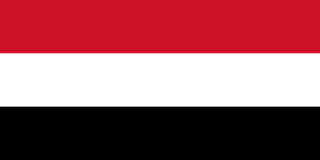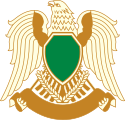
The politics of Libya has been in an uncertain state since the collapse of the Libyan Arab Jamahiriya in 2011 and a recent civil war and various jihadists and tribal elements controlling parts of the country.

The national flag of Libya was originally introduced in 1951, following the creation of the Kingdom of Libya. It was designed by Omar Faiek Shennib and approved by King Idris Al Senussi who comprised the UN delegation representing the three regions of Cyrenaica, Fezzan, and Tripolitania at UN unification discussions.

Islam is the dominant religion in Libya, with 97% of Libyans following Sunni Islam. Article 5 of the Libyan Constitution declared that Islam was the official religion of the state. The post-revolution National Transitional Council has explicitly endeavored to reaffirm Islamic values, enhance appreciation of Islamic culture, elevate the status of Quranic law and, to a considerable degree, emphasize Quranic practice in everyday Libyan life with legal implementation in accordance to Islamic jurisprudence known as sharia. Libya has a small presence of Ahmadis and Shias, primarily consisting of Pakistani immigrants, though unrecognized by the state.

The Third International Theory, also known as the Third Universal Theory and Gaddafism, was the style of government proposed by Muammar Gaddafi on 15 April 1973 in his Zuwara speech, on which his government, the Great Socialist People's Libyan Arab Jamahiriya, was officially based. It combined elements of Arab nationalism, Nasserism, Anti-imperialism, Islamic socialism, left-wing populism, African nationalism, Pan-Arabism, and it was partly influenced by the principles of direct democracy. Another source that the Gaddafi draws from is Islamic fundamentalism; he opposed formal instruction in the meaning of the Qur'an as blasphemous and argued that Muslims had strayed too far from God and the Qur'an. However, Gaddafi's regime has been described as Islamist, rather than fundamentalist, for he opposed Salafism, and many Islamic fundamentalists were imprisoned during his rule.
Jamahiriya is an Arabic word that is difficult to translate but is most commonly expressed in English as "State of the masses" or "Peopledom".

Since 2011, Libya currently does not have an official national emblem. The Constitutional Declaration issued by the National Transitional Council in August 2011 defines the flag of Libya, but does not make any provisions for a coat of arms.

The General People's Congress, often abbreviated as the GPC, was the national legislature of Libya, during the existence of Muammar Gaddafi's Libyan Arab Jamahiriya. It consisted of 2,700 representatives of the Basic People's Congresses (BPC). The GPC was the legislative forum that interacted with the General People's Committee (GPCO), whose members were secretaries of Libyan ministries. It notionally served as the intermediary between the masses and the leadership and was composed of the secretariats of some 600 local "basic popular congresses."

Human rights in Libya is the record of human rights upheld and violated in various stages of Libya's history. The Kingdom of Libya, from 1951 to 1969, was heavily influenced by the British and Y.R.K companies. Under the King, Libya had a constitution. The kingdom, however, was marked by a feudal regime. Due to the previous colonial regime, Libya had a low literacy rate of 10%, a low life expectancy of 57 years, with many people living in shanties and tents. Illiteracy and homelessness were chronic problems during this era, when iron shacks dotted many urban centres in the country.

Muammar Gaddafi became the de facto leader of Libya on 1 September 1969 after leading a group of young Libyan Army officers against King Idris I in a bloodless coup d'état. When Idris was in Turkey for medical treatment, the Revolutionary Command Council (RCC) headed by Gaddafi abolished the monarchy and the old constitution and established the Libyan Arab Republic, with the motto "freedom, socialism and unity". The name of Libya was changed several times during Gaddafi's tenure as leader. From 1969 to 1977, the name was the Libyan Arab Republic. In 1977, the name was changed to Socialist People's Libyan Arab Jamahiriya. Jamahiriya was a term coined by Gaddafi, usually translated as "state of the masses". The country was renamed again in 1986 as the Great Socialist People's Libyan Arab Jamahiriya, after the United States bombing that year.

The Revolutionary Command Council was a twelve-member governing body that ruled the Libyan Arab Republic after the 1969 Libyan coup d'état by the Free Officers Movement, which overthrew the Senussi monarchy of King Idris I. The council's chairman was Muammar Gaddafi, who had the most influence and served as Libya's de facto head of state as Revolutionary Chairman of the Libyan Arab Republic and commander-in-chief of the armed forces. It was ideologically Arab nationalist, republican, anti-imperialist and pan-Arabist.

The General People's Committee, often abbreviated as the GPCO, was the executive branch of the government of Libya, during the existence of Muammar Gaddafi's Libyan Arab Jamahiriya. It served as the intermediary between the masses and government leadership and was composed of the Secretary-General and twenty secretaries of some 600 local Basic People's Congresses (BPC), GPCO members were elected by the country's parliament, the General People's Congress (GPC), and had no fixed terms.

The Libyan passport is issued to citizens of Libya for international travel.

The law of Libya has historically been influenced by Ottoman, French, Italian, and Egyptian sources. Under the Great Socialist People's Libyan Arab Jamahiriya, Libya has moved towards a legal system based on sharia, but with various deviations from it.

The National Transitional Council (NTC) was a transitional government established in the 2011 Libyan civil war. The rebel forces overthrew the Libyan Arab Jamahiriya of Muammar Gaddafi. The NTC governed Libya for a period of ten months after the end of the war, holding elections to a General National Congress on 7 July 2012, and handing power to the newly elected assembly on 8 August.

Libyan Jamahiriya Broadcasting Corporation (LJBC) was the state-run broadcasting organization in Libya under the rule of Muammar Gaddafi. It distributed news in coordination with the Jamahiriya News Agency in accordance with state laws controlling Libya media.

The Brotherly Leader and Guide of the Revolution of the Great Socialist People's Libyan Arab Jamahiriya was a title held by former Libyan leader Muammar Gaddafi, who claimed to be merely a symbolic figurehead of the country's official governance structure. However, critics long described him as a dictator, referring to his position as the de facto former political office, despite the Libyan state's denial of him holding any power.

From 1969 to 2011, the politics of Libya were determined de facto by Muammar Gaddafi, who had been in power since his overthrow of the Kingdom of Libya in 1969.

The 1969 Libyan Constitutional Proclamation was brought into force on December 11, 1969 by the Revolutionary Command Council, in the name of the Arab people of the Libyan Arab Republic. The proclamation would remain in force until the adoption of the interim constitution on August 3, 2011.
The following lists events that happened in 1977 in Libya.

Israel–Libya relations describes the relations between Israel and Libya. While there have been no formal diplomatic agreements between Israel and Libya since Libya's independence, there have been some notable events and developments in their relationship over the years. One of the main reasons for Libya's antagonism towards Israel has been its support for the Palestinian cause. Libya, under the rule of Muammar Gaddafi, was a staunch supporter of the Palestinian cause and provided aid and support to various Palestinian militant groups.









